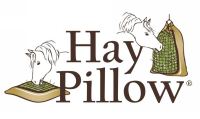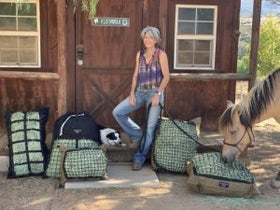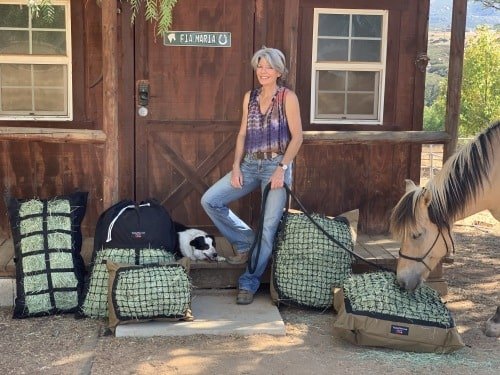Feeding Miniature Horses & Donkeys: Why Slow Fed Forage is Best
And when it comes to nutritional needs and feeding protocols - that means a slow fed, forage-based diet is key. Read on to learn more about why a slow feed strategy is best for your mini and to find answers to common miniature horse diet questions.

What to Feed a Miniature Horse?
Why? Because equines are grazing herbivores with a digestive system designed for constant uptake. Yes: Constant uptake.
How do you allow access to forage or pasture 24/7 without the risk of your mini overdoing it? By choosing the most appropriate hay for weight management (not all low-sugar-starch hays are low calorie) and implementing a slow-feeding program. Slow feeding requires your mini to eat smaller amounts over a longer period of time. This concept simulates natural free-choice foraging - and promotes mental and physical well being.

Do Minis Need Grain or Complete Feeds?
Although there are a variety of formulated complete feeds designed specifically for miniature horses and donkeys intended to replace forage; they are far more calorie dense per pound than hay and rob your equine of chew time and appropriate volume of indigestible fiber. Research in equine nutrition confirms a forage-only or mostly-forage diet is healthiest for all horses regardless of size. (See references below.)
Equines - whether mini or full-size - were not designed to thrive on a high-calorie, nutrient-deficient diet comprised of meals or concentrates. By providing appropriate free-choice forage, you will have a healthier, more content herd.
Learn how to test your hay to ensure low sugar and starch levels for metabolically challenged minis.
Tip: To ensure vitamin and mineral requirements are being met, feed a concentrated supplement mixed into a small amount of soaked hay pellets to avoid the excess calories of a complete feed.
Do Hay Pellets Qualify as Forage?
In addition, the quality of hay is not visible after the pelleting process occurs. Some visible contributing factors in determining hay quality are:
- Color
- Stage of maturity at harvest
- Texture
- Presence of foreign material
- Mold
Learn more about the pros & cons of grass hay verses pellets, cubes and chopped hay.
Mini Horse & Donkey Dental Health Tip

- Retained caps
- Lost and/or broken teeth
- Abnormal or uneven bite planes
- Infected teeth and/or gums
- Periodontal disease
- Hooks - which are sharp protrusions of teeth that can penetrate the opposing gum
Optimal mastication (grinding) requires significant unobstructed motion of the jaw. Eating from ground level in a natural grazing position allows the mandible (jaw bone) to come down and forward in the atlantoaxial and temporomandibular joints. This enables the mandible to move up and down, side to side, forward and back without any restriction - facilitating natural wear of teeth along with optimum mastication and reduction of particle size.
Why Movement is Important for Overall Health
Ways to encourage movement:
- Provide multiple slow feed stations
- Allow multiple individuals to eat and live together full time
- Create a Paddock Paradise / track system
- Provide enrichment toys
- Plan routine exercise
What if My Mini Has a "Hay Belly"?
"A hay belly does not equate to an overweight horse when the rest of his body is normal, actual fat does not accumulate extensively on the horse’s lower abdomen (belly).
Overweight individuals do accumulate worrisome fat in specific areas such as the neck, withers, back, ribs, shoulders, and tail head. Excessive fat in these areas can indicate the calories fed exceed the actual needs of the individual, lack of nutrients necessary for optimum thyroid and hormone function and/or the sugar and starch levels in your feeding program need to be assessed and/or reduced.
Horse owners who deliberately limit hay consumption and replace it with cereal grain, hay pellets or complete feeds to avoid a hay belly are doing their horses a disservice and increase the risk of digestive and metabolic disorders. Forage (hay or pasture) should be the foundation of all horse’s diet."
Additional causes of a distended abdomen can be attributed to ulcers and/or parasites. Excessive gas can give the appearance of a hay belly from large amounts of indigestible fiber lacking optimum mastication either from bolting hay or dental challenges.
Slow feeding encourages more chew time reducing the size of particles and increasing saliva production better preparing fiber for the digestive tract.
~ Fred
How to Deal with Special Dietary Needs & Metabolic Issues
For information on insulin resistance, overall nutrition, and balancing a diet to your specific forage, visit these websites:
- Juliet M. Getty, Ph.D. at https://gettyequinenutrition.com/
- Eleanor M. Kellon, VMD at www.drkellon.com. Dr. Kellon offers classes online to learn how to interpret a hay or pasture analysis and formulate a custom vitamin/mineral mix balanced to that specific forage.
Helpful How To Resources For Slow Feeding
- Feeding Donkeys Straw and Hay: Q & A with The Donkey Sanctuary
- Beyond Low Sugar/Starch - Choosing Hay for Weight Management
- Sand Colic - The Surprising (Simple) Cure & Prevention
- How to Introduce & Incorporate Free-Choice Forage: A Detailed Action Plan
- Slow Feed Solutions for Any Environment
- 6 Great Reasons to Feed Your Horse from Ground Level
- Slow Feeding Fails: Avoid These Common Misconceptions
- 9 Benefits of Slow Feeding Horses
- 7 Easy Ways to Help Prevent Colic
- Never Exercise Horses on an Empty Stomach...Ever
- Equine Gastric Acid - 12 Facts You May Not Know
- Why You Shouldn't Transport Horses On An Empty Stomach
- Keeping Horses Warm Naturally – Internally and Externally
- Why Most Horse Prefer to Eat Outside
References:
- Bazay, Casie; The Naturally Healthy Horse Blog. Forage-Only Diet for Horses? Retrieved from http://thenaturallyhealthyhorse.com/forage-diet-horses/
- Getty, Juliet M. Ph.D. Does That Hay Belly Really Mean Your Horse is Fat? Retrieved from https://gettyequinenutrition.com/pages/does-that-hay-belly-really-mean-your-horse-is-fat
- Freedom Health, LLC (2011, August). Colic, Colonic Ulcers and the Equine Digestive Tract. Retrieved from https://www.montyroberts.com/wp-content/uploads/2011/10/Colic-White-Paper.pdf
- Getty, Juliet M. Ph.D. Free-Choice Forage Feeding – Beyond the Basics. Retrieved from https://gettyequinenutrition.com/pages/free-choice-forage-feeding-beyond-the-basics
- Getty, Juliet M. Ph.D. Horse Digestion - It's Decidedly Different! Retrieved from Excerpt tab https://gettyequinenutrition.com/products/equine-digestion-book
- Ridgway, K. J. DVM (2011). Equine Ulcers – You Really Need To Know More! Retrieved from https://drkerryridgway.com/2016/07/05/equine-ulcers/









